What is the benefit of experience? How retail FX traders learn to trade.
Regulators have concerns about losses in the retail sector of the foreign exchange trading market. This study examined whether traders learn with experience to reduce their losses over time.
The foreign exchange market is a global market for the trading of currencies. Transactions amount to trillions of dollars per day, and the rewards and losses can be significant. For this study, the researchers investigated how retail foreign exchange (FX) traders learn their craft, analysing the performance of almost 100,000 FX traders over a period of two and a half years.
They focused on several basic categories of learning identified by the existing literature. The first, learning by doing, implies that traders would become more skilled as they gain experience. The study found no evidence of this occurring. If anything, average performance deteriorates slightly with experience, and even very experienced traders may lose money on average. This finding is consistent with irrational learning - where traders interpret signals about their abilities in overly positive ways, adapting their strategies but in doing so taking on inappropriate trades and making increasing losses. The authors find that most retail FX traders make losses on average, even very experienced traders.
The second category considered was rational learning about ability. Here, the underlying ability of traders does not change but the experience of trading gives them a better perception of their underlying ability to trade profitably.
The research found strong evidence that traders follow this mode of learning. Following losses, traders were more likely to cease trading, trade smaller amounts and trade less frequently. Following a positive signal, they were seen to trade both more frequently and in greater volume. Novice traders were found to be more sensitive to performance signals than experienced traders, who may have already learned from being in the market longer.
The research concludes therefore that traders generally respond fairly rationally to the evidence of their own profit-making aptitude. This suggests that no matter how confident traders are initially, providing them with better information about the profitability of the earlier traders should compel them to come to the appropriate decisions at an earlier stage. The evidence of this paper therefore supports regulator proposals for enhanced disclosure about average trader performance.
However, while some retail traders rationally learn that they should not be active in the FX market and quit following losses, others irrationally continue to trade and simply rack up greater losses. It suggests that regulators' concerns about volatility in this sector of the foreign exchange market are justified.
This paper has been published in the Journal of International Money and Finance.
The accepted version of the paper is available to download at the link below.
Cass Knowledge Summary Contribution - Dr. Permjit Singh




